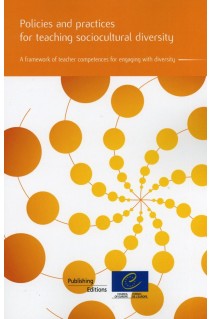



Future teachers require specific training on democratic culture and social cohesion. By focusing on reflective thinking, training can enable them to situate themselves in diverse environments, develop a clearer sense of their ethnic and cultural identities and examine attitudes to different groups.Improving diversity management at school in Europe begins with initial teacher training establishments. This book is designed to provide a basis to help ensure that the needs of future teachers in this regard are met. It puts forward 18 "diversity competences" that were identified by a team of European specialists in teacher training between 2006 and 2009.In order to open up the debate on competences, four consultation sessions were organised in Austria, Bulgaria, Cyprus and Estonia. These sessions provided an opportunity to discuss these competences with key players (civil servants, government representatives, teacher trainers, head teachers, researchers, teachers and students) from a national and topic-based perspective.
Part I: The development of competences for dealing with sociocultural diversity and inclusion in education - Process and outcomes
Chapter 1: The Council of Europe project on Policies and Practices for Teaching Sociocultural Diversity
1.1 Introduction
1.2 Teacher education: a priority for Council of Europe intergovernmental co-operation in the field of education
1.3 The project and its objectives (2006-09)
1.3.1 First phase (2006-07)
1.3.2 Second phase (2007-08)
1.3.3 Third phase (2008-09)
1.4 Sociocultural diversity
Chapter 2: The consultation tables
2.1 Introduction
2.2 The consultation tables method
2.3 The consultation table reports
2.3.1 Consultation Table 1: Austria
2.3.1.1 Main topic and context
2.3.1.2 Participants
2.3.1.3 Outcomes
2.3.2 Consultation Table 2: Cyprus
2.3.2.1 Main topic and context
2.3.2.2 Participants
2.3.2.3 Outcomes
2.3.3 Consultation Table 3: Bulgaria
2.3.3.1 Main topic and context
2.3.3.2 Participants
2.3.3.3 Outcomes
2.3.4 Consultation Table 4: Estonia
2.3.4.1 Main topic and context
2.3.4.2 Participants
2.3.4.3 Outcomes
Chapter 3: Learning through the consultation tables
3.1 Learning by the project team
3.1.1 Identity, ethnicity and language
3.1.2 Teacher education contexts
3.1.3 Integration, inclusion and exclusion
3.2 Learning by the participants
Chapter 4: Key competences for diversity
4.1 Introduction
4.2 The concept and context of competence
4.3 The rationale for the competence approach
4.4 Outline of the competence framework
4.5 Competence areas
4.5.1 First cluster of competences: knowledge and understanding
4.5.2 Second cluster of competences: communication and relationships
4.5.3 Third cluster of competences: management and teaching
4.6 Taking the competences forward
Chapter 5: Recommendations
5.1 Introduction
5.2 Knowledge and understanding
5.3 Communication and relationships
5.4 Management and teaching
References
Part II: The competences in action
Chapter 6: Examples of practice
6.1 Introduction
6.2 Index of examples of practice
1. Language biographical methods research and education - Austria
2. Teaching minority languages in Burgenland - Austria
3. Implementation of zones of educational priority - Cyprus
4. Debating collective memory and culture - Cyprus
5. Students in thick interpretation of ethnic borders - Cyprus
6. Deconstructing TV representations - Cyprus
7. Enhancing diversity in Estonian teacher education - Estonia
8. Improvement of study practice and the mentoring system of newly qualified teachers in Lithuania
9. SCHOLION -A learning platform in teacher education - Austria
10. Teacher education for ethnocultural diversity at Sofia University - Bulgaria
11. Teacher education for ethnocultural diversity at Shumen University- Bulgaria
12. Trio -An entirely original concept - Austria
13. Do we need changes in our teacher education? - Estonia
14. NQTNE Network - Estonia
Chapter 7: Research papers
7.1.
Télécharger un extrait (1000)

Future teachers require specific training on democratic culture and social cohesion. By focusing on reflective thinking, training can enable them to situate themselves in diverse environments, develop a clearer sense of their ethnic and cultural identities and examine attitudes to different groups.Improving diversity management at school in Europe begins with initial teacher training establishments. This book is designed to provide a basis to help ensure that the needs of future teachers in this regard are met. It puts forward 18 "diversity competences" that were identified by a team of European specialists in teacher training between 2006 and 2009.In order to open up the debate on competences, four consultation sessions were organised in Austria, Bulgaria, Cyprus and Estonia. These sessions provided an opportunity to discuss these competences with key players (civil servants, government representatives, teacher trainers, head teachers, researchers, teachers and students) from a national and topic-based perspective.
Attention, en vertu de nos conditions générales de vente, l'achat des PDF/epub est réservé aux particuliers.
